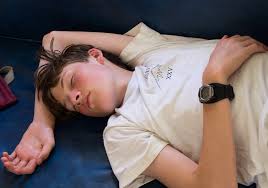
The researchers conducted their study via a treatment program for young children at Bradley Hospital. The Pediatric Partial Hospital Program (PPHP) is a family-centered, intensive treatment program for children from birth through age six who have serious emotional, behavioral, or relationship disturbances. The researchers evaluated 183 children in the PPHP for sleep disorders, including Sleep Onset Insomnia (SOI) and Night Waking Insomnia (NWI).
Children involved in PPHP had a higher prevalence of sleep disorders than expected. Of the group, 41 percent met the diagnostic criteria for a sleep disorder. The research demonstrated that sleep problems are especially common in children struggling with disruptive behavior, attention, anxiety, and mood problems.
When children with behavior problems cannot sleep, their daytime symptoms are exacerbated. That is why it is important for families to monitor their children’s sleep patterns and for clinicians to ask about sleep trouble during routine checkups.
“This study is a great reminder that it’s crucial for mental health providers working with young children and their families to ask about children’s sleep. Simple questions about children’s sleep patterns … may yield important information that is relevant to clinical care, even when sleep problems are not the primary focus of treatment,” stated lead researcher and clinical director of the PPHP John Boekamp, Ph.D.
This research is published in the journal Child Psychiatry & Human Development.
Previous news in sleep:



 © 2025 Unyte Health US Inc.
© 2025 Unyte Health US Inc.